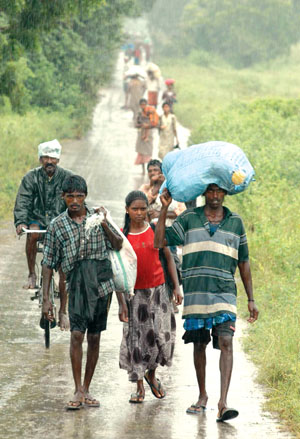Ilankai Tamil Sangam30th Year on the Web Association of Tamils of Sri Lanka in the USA |
||||
 Home Home Archives Archives |
Sri Lanka Tense as Govnt Makes 'Final Push' Against Tigersby Stefan Smith, AP, April 12, 2007
Tensions are running high in Sri Lanka's east as government troops fight what they insist is the "climax" of a battle to clear vast jungle areas of Tamil Tiger rebels. Still trying to recover from the 2004 Asian tsunami, the eastern coastal town of Batticaloa and surrounding areas have become a stalking ground for shadowy death squads and private armies engaged in daily murders, kidnappings and extortion, local officials and aid workers say. Tens of thousands of people have been displaced, and most expect the situation to get worse before it gets better. "It's miserable for the civilian population. There is a climate of absolute impunity. Everyone seems to have thrown aside the rule book," said a western aid worker based in the Tamil-majority area. "There's a dirty war being fought here, and there seems to be no end in sight," said the relief worker, who asked not to be named citing the fear of being targetted. Since a 2002 Norwegian-brokered ceasefire agreement fell apart a year ago, government forces have focussed their efforts on wresting full control of the island's east and eliminating pockets of intensive Liberation Tigers of Tamil Eelam (LTTE) activity. The Sri Lankan military says success would mean confining the Tigers, who are battling to set up an independent state across swathes of the north and east, to a single area in the north of the island. While some officials assert that they merely want to bring the LTTE back to the negotiating table, others talk openly of "eliminating" them once and for all. In January, government forces "liberated" the small coastal town of Vakarai, just to the north of Batticaloa and the last of the Tigers' formalised bastions in the east. Vakarai is now a ghost town, with many of its buildings flattened by government shelling and strewn with landmines left behind by the rebels. Daya Ratnayake, a gung-ho army brigadier in charge of much of the eastern front, prefers to call it a "defensive humanitarian operation." "This is the climax. The LTTE are desperate. It's a matter of time," he told AFP in Welikanda, a leafy garrison town inland from Batticaloa. "We will not take more than two months to get the east clear of these terrorists. Now the only major concentration of Tigers in the east is just outside Batticaloa, and we know how to get rid of them now," he told AFP. The guerrillas who used to run Vakarai as a separate fiefdom, however, appear to have simply melted away into the jungles and rocky outcrops that line the otherwise idyllic east coast. Formal battle lines have been replaced by a massive security blanket designed to stifle the activities of rebels who could be anywhere and everywhere. The entire mobile telephone network has even been shut down to stop the rebels using phones for communications or detonating one of their favoured weapons -- huge roadside bombs packed with ball bearings. Checkpoints and machine gun bunkers dot the landscape, although several roads are controlled by the Tigers by night. Even in daylight, senior officials prefer to move around in disguise and in unmarked vehicles. "The trouble is you don't know who is who. You push the Tigers from one place and they move somewhere else. You push them from somewhere else and they move back here. They could be anywhere," said a police official, who also preferred not to be named. A further complication is the presence of the Karuna faction, a group of breakaway Tamil Tigers now allied with central government and -- despite official denials -- widely viewed as guns for government hire. Human rights groups and even local police -- speaking privately at least -- say both the LTTE and Karuna faction are actively preying on local business for cash and on displaced persons camps for recruits including child soldiers. Officials also live in constant fear of so-called 'pistol squads', or Tamil Tigers in civvies who can pull out a 9mm pistol and assassinate whenever the ideal opportunity arises -- on a street corner, in a temple, in a restaurant. The senior police officer in the newly-captured town of Vakarai, U.S.I. Perera, said he cannot even take a morning dip at the beach just a stone's throw away from his heavily fortified police station. "I don't want to get shot by a pistol squad coming out of the sea," he said while providing a tour of the town along with several well-armed guards. Brigadier Ratnayake, however, is optimistic the government finally has the upper hand in Asia's longest running civil war, citing their "hearts and minds" campaign including compensation for people whose houses have been blown up. "It is all about hearts and minds. We are adopting better methods, and getting the local population on our side. "When you are fighting guerrillas, terrorists, you can never be sure," he said. "But we have them on the defensive. We are not working to a timescale, but we don't want it to drag on." |
|||
|
||||
